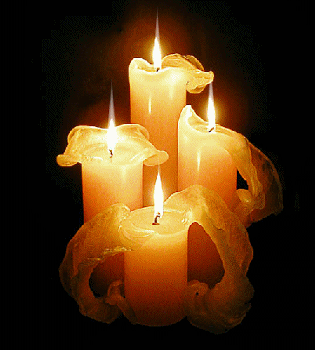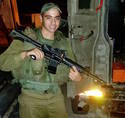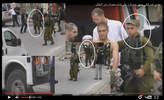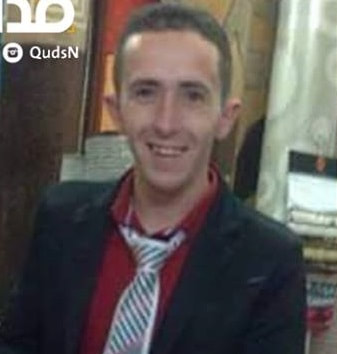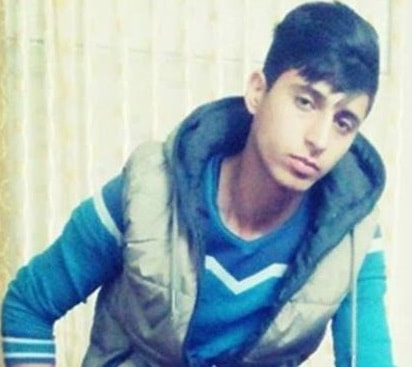4 apr 2016
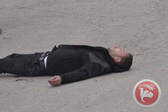
The family of Abd al-Fattah al-Sharif said they would file legal procedures against the Israeli army in front of an Israeli court, after an autopsy of the 21-year-old Palestinian’s body confirmed that he was still alive when an Israeli soldier fired a bullet at his head at point-blank range, killing him.
A graphic video released by B’Tselem captured the moment the soldier stepped forward and shot al-Sharif in the head on March 24 in Hebron, after he had been gunned down and left lying on the ground severely wounded for several minutes after allegedly stabbing an Israeli soldier.
In a press conference at Hebron governor’s office, the al-Sharif’s uncle Fathi al-Sharif also urged the Palestinian Authority to file legal procedures against Israel at the International Criminal Court.
He also urged the PA and human rights organizations to push for the release his nephew’s body, which is still being withheld by Israel.
Hebron Governor Kamil Hmeid said at the news conference that the PA would “document the crime and refer it to international courts in order to expose the crimes Israel has been committing since the beginning of the popular rising in October 2015.”
Palestinian doctor Rayan al-Ali, who attended al-Sharif's autopsy on Sunday, reiterated that “the last bullet which an Israeli soldier fired at al-Sharif’s head at point-blank range was the direct cause of death.”
Al-Ali added that he had prepared an in-depth report about the autopsy, which also revealed that al-Sharif was hit by seven or eight bullets which caused 17 wounds in his body.
The soldier who killed al-Sharif has claimed he acted in self defense and is facing charges of manslaughter rather than murder as had been widely expected.
He was released into open detention on Friday in an Israeli military camp, after an appeal by the prosecution was denied to extend his remand for another five days.
The international community has reacted in the wake of al-Sharif's killing, expressing worries that it might be part of a broader Israeli "shoot to kill" policy against Palestinian suspected attackers.
"We are concerned this killing may not be a lone incident," UN High Commissioner for Human Rights, Rupert Colville said in a recent statement, adding that "all incidents where security forces have caused death or injury should be fully investigated, and those responsible brought to account."
Rights groups have also repeatedly criticized Israel for offering impunity to Israelis who harm Palestinians.
Al-Sharif was among the more than 200 Palestinians who have been killed by Israeli forces and settlers since a wave of unrest spread across the occupied Palestinian territory in October.
The unrest has been marked by a surge of small-scale attacks carried out by Palestinian individuals -- predominantly on Israeli military targets -- which have left nearly 30 Israelis dead, with the majority of suspected Palestinian attackers shot dead on site.
A graphic video released by B’Tselem captured the moment the soldier stepped forward and shot al-Sharif in the head on March 24 in Hebron, after he had been gunned down and left lying on the ground severely wounded for several minutes after allegedly stabbing an Israeli soldier.
In a press conference at Hebron governor’s office, the al-Sharif’s uncle Fathi al-Sharif also urged the Palestinian Authority to file legal procedures against Israel at the International Criminal Court.
He also urged the PA and human rights organizations to push for the release his nephew’s body, which is still being withheld by Israel.
Hebron Governor Kamil Hmeid said at the news conference that the PA would “document the crime and refer it to international courts in order to expose the crimes Israel has been committing since the beginning of the popular rising in October 2015.”
Palestinian doctor Rayan al-Ali, who attended al-Sharif's autopsy on Sunday, reiterated that “the last bullet which an Israeli soldier fired at al-Sharif’s head at point-blank range was the direct cause of death.”
Al-Ali added that he had prepared an in-depth report about the autopsy, which also revealed that al-Sharif was hit by seven or eight bullets which caused 17 wounds in his body.
The soldier who killed al-Sharif has claimed he acted in self defense and is facing charges of manslaughter rather than murder as had been widely expected.
He was released into open detention on Friday in an Israeli military camp, after an appeal by the prosecution was denied to extend his remand for another five days.
The international community has reacted in the wake of al-Sharif's killing, expressing worries that it might be part of a broader Israeli "shoot to kill" policy against Palestinian suspected attackers.
"We are concerned this killing may not be a lone incident," UN High Commissioner for Human Rights, Rupert Colville said in a recent statement, adding that "all incidents where security forces have caused death or injury should be fully investigated, and those responsible brought to account."
Rights groups have also repeatedly criticized Israel for offering impunity to Israelis who harm Palestinians.
Al-Sharif was among the more than 200 Palestinians who have been killed by Israeli forces and settlers since a wave of unrest spread across the occupied Palestinian territory in October.
The unrest has been marked by a surge of small-scale attacks carried out by Palestinian individuals -- predominantly on Israeli military targets -- which have left nearly 30 Israelis dead, with the majority of suspected Palestinian attackers shot dead on site.

Two Palestinian Human Rights activists believe that the results of the autopsy conducted on the body of Abdel Fattah al-Sharif can be used as evidence to condemn Israel and prevent the closure of cases against its soldiers, who carry out field executions of Palestinians civilians.
Sharif was executed by an Israeli soldier on March 24 while lying motionless on the ground after being earlier shot and wounded in the old town of al-Khalil for allegedly trying to stab another soldier.
Al-Haq human rights institution director, Sha’wan Jabarin, asserted that the autopsy results confirm the truth, which is premeditated murder, as monitored by the cameras in the place.
Fatal shot
Rayan al-Ali, the Palestinian doctor who attended the autopsy on Sunday, in the Abu Kabir Institute in occupied Jerusalem, confirmed that the last bullet fired by the Israeli soldier at Sharif's head, after he was injured and was lying on the ground, is the cause of his death.
The Israeli soldier was arrested after the uproar caused by the video that documented the crime, but then was released and kept in custody within his battalion.
The Israeli prosecution reneged on charging the soldier of murder and charged him instead with involuntary manslaughter, according to the Hebrew media.
Dr. al-Ali pointed out that it was possible that Sharif would have been alive before being shot at his head; as most of the bullets that hit him before the soldier’s fatal shot wounded his feet and other non-vital parts of his body.
Shooting to kill
Jabarin believes that these data confirm that the Israeli soldiers shoot to kill. He pointed out that the judicial system in Israel manipulates the charge title to mitigate the offense of the killer; it is trying to alleviate the cause of death and not the process of murder, these words in the legal sense have their indications and consequences in the favor of the killer soldier.
He said: "We have to follow-up on the case, as Israel will try to manipulate the terminology and the type and size of conviction.
Hence we must complete the file in the case and to accuse the killer soldier with the true charge of the crime, which is murder, a war crime".
He added that the video that documented the crime was the only reason why the soldier was arrested and interrogated.
This confirms the importance of the media and the importance of eyewitnesses and technical report regarding the autopsy of the bodies, which we must not compromise with, and we must insist on the presence of a Palestinian doctor in the process, he elaborated.
Relying on the autopsy results
For his part, the head of the legal unit of the Palestinian Prisoners Society, lawyer Jawad Boulus, stressed the importance of relying on the autopsy results conducted on Sharif's body to condemn the Israeli soldier, who deliberately committed the murder crime.
He stressed the importance of following up these crimes through the legal process, especially at this time in which Israel suffers from unprecedented moral decline including the decline in values of human rights, and encouraging murder against Arabs, Palestinians and minorities in the Israeli society.
He called for confronting the field executions against our people by professional documentation to be used by human rights institutions, agencies, governmental and non-governmental organizations, so as to expose the Israeli occupation before the world public opinion, and convict Israel before the competent courts.
Sharif was executed by an Israeli soldier on March 24 while lying motionless on the ground after being earlier shot and wounded in the old town of al-Khalil for allegedly trying to stab another soldier.
Al-Haq human rights institution director, Sha’wan Jabarin, asserted that the autopsy results confirm the truth, which is premeditated murder, as monitored by the cameras in the place.
Fatal shot
Rayan al-Ali, the Palestinian doctor who attended the autopsy on Sunday, in the Abu Kabir Institute in occupied Jerusalem, confirmed that the last bullet fired by the Israeli soldier at Sharif's head, after he was injured and was lying on the ground, is the cause of his death.
The Israeli soldier was arrested after the uproar caused by the video that documented the crime, but then was released and kept in custody within his battalion.
The Israeli prosecution reneged on charging the soldier of murder and charged him instead with involuntary manslaughter, according to the Hebrew media.
Dr. al-Ali pointed out that it was possible that Sharif would have been alive before being shot at his head; as most of the bullets that hit him before the soldier’s fatal shot wounded his feet and other non-vital parts of his body.
Shooting to kill
Jabarin believes that these data confirm that the Israeli soldiers shoot to kill. He pointed out that the judicial system in Israel manipulates the charge title to mitigate the offense of the killer; it is trying to alleviate the cause of death and not the process of murder, these words in the legal sense have their indications and consequences in the favor of the killer soldier.
He said: "We have to follow-up on the case, as Israel will try to manipulate the terminology and the type and size of conviction.
Hence we must complete the file in the case and to accuse the killer soldier with the true charge of the crime, which is murder, a war crime".
He added that the video that documented the crime was the only reason why the soldier was arrested and interrogated.
This confirms the importance of the media and the importance of eyewitnesses and technical report regarding the autopsy of the bodies, which we must not compromise with, and we must insist on the presence of a Palestinian doctor in the process, he elaborated.
Relying on the autopsy results
For his part, the head of the legal unit of the Palestinian Prisoners Society, lawyer Jawad Boulus, stressed the importance of relying on the autopsy results conducted on Sharif's body to condemn the Israeli soldier, who deliberately committed the murder crime.
He stressed the importance of following up these crimes through the legal process, especially at this time in which Israel suffers from unprecedented moral decline including the decline in values of human rights, and encouraging murder against Arabs, Palestinians and minorities in the Israeli society.
He called for confronting the field executions against our people by professional documentation to be used by human rights institutions, agencies, governmental and non-governmental organizations, so as to expose the Israeli occupation before the world public opinion, and convict Israel before the competent courts.
3 apr 2016
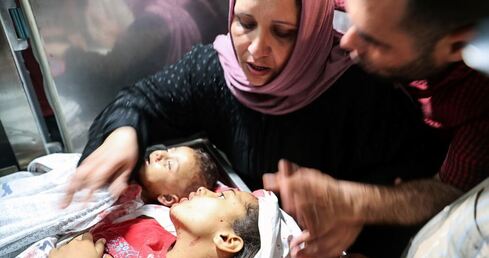
Givati's battalion commanders relate the difficulties they face out in the field dealing with disturbances from both sides as well as methods developed by brigade to successfully conclude terrorist incidents without anyone being killed.
In the wake of the recent incident in which an IDF soldier shot an already-neutralized terrorist, one that has shaken the IDF as well as the entire nation, four of Givati Brigade's commanders tell Ynet, in a special interview, of the difficulties that characterized a terror-filled six months. The interview was conducted after a six month period of operation in the West Bank, at the height of the third intifada. The meeting with the battalion commanders took place last week on the summit of Mount Kabir, which overlooks Nablus and is near the lone road leading to Elon Moreh, where the terror wave began with the murder of Eitam and Na'ama Henkin last October.
A few hours before the interview with the commanders the shooting incident in Hebron took place in an area that was previously manned by battalion commander, Lt. Col. Kobi Barel. "It is an unethical and extremist act, and we don't train our soldiers to act that way," he says. "There were hundreds of similar cases and we did not see results like that happening. A scene like that draws fire, media and crowds. That is why the scene needs to be closed off, isolated and the body cleared away as fast as possible."
A day later it became clear that three of Kfir Brigade's officers delayed handling the terrorists and they were reprimanded. The Givati battalion commander had a few exceptional incidents against Palestinians in recent months, and talked about methods that were developed by brigade to successfully conclude terrorist incidents without anyone being killed.
"Palestinians stand behind red lines we draw on the ground, they are checked from there in order to maintain a safe distance from the soldiers. That way a terrorist who attacks with a drawn knife has no advantage. Our soldiers took their positions after short training sessions in krav maga (Israeli hand to hand combat method- ed.) and shooting drills. We called this warming up before a mission, this strengthened and sharpened our infantrymen," he explained.
According to the testimonies of Kfir Brigade soldiers, the soldier from the Shimshon battalion fired emotionally after he told the platoon commander and his friend that "we should kill the terrorist who stabbed my friend". In Givati, probably as a preventive measures for such situations, many discussions were held about instances and dilemmas between commanders and their soldiers. "Squad and platoon leaders talk to soldiers about little incidents that happen, so that they can vent their emotions."
The discussion with the battalion commanders reveal the IDF's transformation over the past year regarding the conceptualization of managing the territories in the West Bank. The discretion used to save the Palestinian population's fabric of life of is integrated and receiving greater weight in operational activity, and in the tactical decisions that are received in the intensive assessments and those that are held after attacks.
"The battalions entirely revamped their approach to how they approach keeping law and order. We put borders in conflict areas," Barel said. Rotem battalion's commander, Lt. Col. Liron Betito experienced this firsthand, who, after the attack in his area where the Henkin couple were murdered, sent forces to protect the Palestinian's annual olive harvest near the settlement area. "We grew white hairs after that," admitted Lt. Col. Betito. "We operated with a clear policy , the Palestinians harvest olives until the last tree, and this created friction".
In the neighboring area, west of Nablus, Lt. Col Nir Ben Hamo was in charge of the brigade's reconnaissance battalion. There the infantrymen faced the conflict between the Palestinians and settlers in the Yitzhar area. "He handled fits of rage from settlers, but we also had commanders in the area in these events, and we play a part in controlling these kind of events. We arrested people who tried to damage the other side in a way that could fan the fire. We did not allow innocents to get hurt."
Givati Brigade hammered the Palestinian terrorists day and night with hundreds of arrests. Lt. Col. Betito recalls the evacuation of the Jewish worshippers who sneaked into Joseph's Tomb in Nablus at night, during the peak of the incitement. "At 2am I got alerted because worshippers entered Joseph's tomb in a vehicle. We quickly drove over there with what we had, just four vehicles.
At the entrance to Nablus we were stopped by a Palestinian police checkpoint. They refused to let us pass. After talking to them we crossed the checkpoint and proceeded to the tomb," he recounted. He said there were hundreds of Palestinians gathered around five Jews, and armed Palestinian police officers aiming their weapons at his soldiers. "I immediately recognized the senior Palestinian police officer in the area, we calmed the situation down, but it was surreal. Eventually we safely rescued the worshippers," he concluded.
The commander of Shaked battalion, Lt. Col Eyal Schwimmer, remembers the shooting attack at the checkpoint at the entrance to Ramallah where two Shaked infantrymen were wounded. "The Palestinian Authority agent drew his pistol from his vehicle, a pistol instead of his ID, and fired five bullets at them. He continued to drive towards Beit El. The event ended when soldiers who were injured in addition to another soldier at the checkpoint, fired towards him despite their injuries and killed him. We are talking about soldiers in the training platoon, they were barely nine months in the military."
It seems that the battalion commanders, who live the complex reality that exists out there, are more proficient than the top brass in the nuances that will influence the terror wave. "The less success the lone wolves have, the less copycat attacks will happen.
The easiest thing is to close off areas, but restraint is strength. We also allowed the fabric of life in Hebron to continue and no Palestinian stores were closed after the attacks. Another Defensive Shield is not relevant at this time. "
The battalion commanders rebut the claims, especially made among some on the right, of a soft hand towards firing at Palestinians. "When a terrorist comes to attack a soldier or citizen, the infantryman must immediately neutralize him. During disturbances it is different, and it should be handled with no fatalities on the other side," Lt. Ben Hamo said. Lt. Col. Barel said that "we encountered many incidents that could have ended up with dead Palestinians but it was still within the rules of engagement."
In the wake of the recent incident in which an IDF soldier shot an already-neutralized terrorist, one that has shaken the IDF as well as the entire nation, four of Givati Brigade's commanders tell Ynet, in a special interview, of the difficulties that characterized a terror-filled six months. The interview was conducted after a six month period of operation in the West Bank, at the height of the third intifada. The meeting with the battalion commanders took place last week on the summit of Mount Kabir, which overlooks Nablus and is near the lone road leading to Elon Moreh, where the terror wave began with the murder of Eitam and Na'ama Henkin last October.
A few hours before the interview with the commanders the shooting incident in Hebron took place in an area that was previously manned by battalion commander, Lt. Col. Kobi Barel. "It is an unethical and extremist act, and we don't train our soldiers to act that way," he says. "There were hundreds of similar cases and we did not see results like that happening. A scene like that draws fire, media and crowds. That is why the scene needs to be closed off, isolated and the body cleared away as fast as possible."
A day later it became clear that three of Kfir Brigade's officers delayed handling the terrorists and they were reprimanded. The Givati battalion commander had a few exceptional incidents against Palestinians in recent months, and talked about methods that were developed by brigade to successfully conclude terrorist incidents without anyone being killed.
"Palestinians stand behind red lines we draw on the ground, they are checked from there in order to maintain a safe distance from the soldiers. That way a terrorist who attacks with a drawn knife has no advantage. Our soldiers took their positions after short training sessions in krav maga (Israeli hand to hand combat method- ed.) and shooting drills. We called this warming up before a mission, this strengthened and sharpened our infantrymen," he explained.
According to the testimonies of Kfir Brigade soldiers, the soldier from the Shimshon battalion fired emotionally after he told the platoon commander and his friend that "we should kill the terrorist who stabbed my friend". In Givati, probably as a preventive measures for such situations, many discussions were held about instances and dilemmas between commanders and their soldiers. "Squad and platoon leaders talk to soldiers about little incidents that happen, so that they can vent their emotions."
The discussion with the battalion commanders reveal the IDF's transformation over the past year regarding the conceptualization of managing the territories in the West Bank. The discretion used to save the Palestinian population's fabric of life of is integrated and receiving greater weight in operational activity, and in the tactical decisions that are received in the intensive assessments and those that are held after attacks.
"The battalions entirely revamped their approach to how they approach keeping law and order. We put borders in conflict areas," Barel said. Rotem battalion's commander, Lt. Col. Liron Betito experienced this firsthand, who, after the attack in his area where the Henkin couple were murdered, sent forces to protect the Palestinian's annual olive harvest near the settlement area. "We grew white hairs after that," admitted Lt. Col. Betito. "We operated with a clear policy , the Palestinians harvest olives until the last tree, and this created friction".
In the neighboring area, west of Nablus, Lt. Col Nir Ben Hamo was in charge of the brigade's reconnaissance battalion. There the infantrymen faced the conflict between the Palestinians and settlers in the Yitzhar area. "He handled fits of rage from settlers, but we also had commanders in the area in these events, and we play a part in controlling these kind of events. We arrested people who tried to damage the other side in a way that could fan the fire. We did not allow innocents to get hurt."
Givati Brigade hammered the Palestinian terrorists day and night with hundreds of arrests. Lt. Col. Betito recalls the evacuation of the Jewish worshippers who sneaked into Joseph's Tomb in Nablus at night, during the peak of the incitement. "At 2am I got alerted because worshippers entered Joseph's tomb in a vehicle. We quickly drove over there with what we had, just four vehicles.
At the entrance to Nablus we were stopped by a Palestinian police checkpoint. They refused to let us pass. After talking to them we crossed the checkpoint and proceeded to the tomb," he recounted. He said there were hundreds of Palestinians gathered around five Jews, and armed Palestinian police officers aiming their weapons at his soldiers. "I immediately recognized the senior Palestinian police officer in the area, we calmed the situation down, but it was surreal. Eventually we safely rescued the worshippers," he concluded.
The commander of Shaked battalion, Lt. Col Eyal Schwimmer, remembers the shooting attack at the checkpoint at the entrance to Ramallah where two Shaked infantrymen were wounded. "The Palestinian Authority agent drew his pistol from his vehicle, a pistol instead of his ID, and fired five bullets at them. He continued to drive towards Beit El. The event ended when soldiers who were injured in addition to another soldier at the checkpoint, fired towards him despite their injuries and killed him. We are talking about soldiers in the training platoon, they were barely nine months in the military."
It seems that the battalion commanders, who live the complex reality that exists out there, are more proficient than the top brass in the nuances that will influence the terror wave. "The less success the lone wolves have, the less copycat attacks will happen.
The easiest thing is to close off areas, but restraint is strength. We also allowed the fabric of life in Hebron to continue and no Palestinian stores were closed after the attacks. Another Defensive Shield is not relevant at this time. "
The battalion commanders rebut the claims, especially made among some on the right, of a soft hand towards firing at Palestinians. "When a terrorist comes to attack a soldier or citizen, the infantryman must immediately neutralize him. During disturbances it is different, and it should be handled with no fatalities on the other side," Lt. Ben Hamo said. Lt. Col. Barel said that "we encountered many incidents that could have ended up with dead Palestinians but it was still within the rules of engagement."
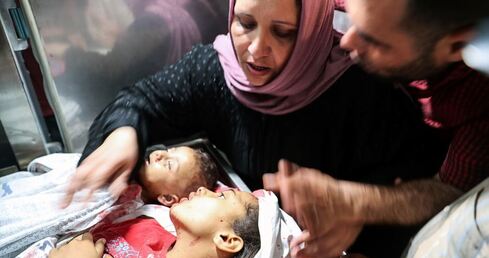
The autopsy conducted on the body Abd al-Fatah al-Sharif on Sunday confirmed that the 21-year-old Palestinian was still alive before a bullet fired at his head at point-blank range by an Israeli soldier killed him, according to a statement from the Palestinian Prisoner’s Society.
Palestinian doctor Rayan al-Ali, who attended al-Sharif's autopsy, said: “The results of the autopsy were expected. What the whole world saw on the video that documented the shooting was more than enough, but the autopsy results assured it.”
He added in his statement that he would hold a press conference on Monday to give further details about the results of the autopsy, which took place at the Israeli Institute for Forensic Medicine in Abu Kabir near Tel Aviv.
A court order by the Israeli Supreme Court Thursday denied an appeal to allow a Palestinian doctor to partake in the autopsy itself.
The court later granted permission for al-Ali to merely attend and take notes for the autopsy report of al-Sharif, whose killing by an Israeli soldier on March 24 has been branded by the UN as an “extrajudicial execution.”
A graphic video released by B’Tselem captured the moment the soldier stepped forward and shot al-Sharif in the head at point-blank range, after he had been gunned down and left lying on the ground severely wounded for several minutes.
According to Israeli media, the autopsy was conducted as part of an investigation being carried out by the Israeli public military prosecutor to determine if al-Sharif was killed by the initial gunshots that visibly incapacitated him or the final bullet that was fired at zero range.
The soldier has claimed he acted in self defense and is facing charges of manslaughter rather than murder as had been widely expected.
In the video, Israeli soldiers can be heard saying “this dog is still alive” in Hebrew, and the soldier who shot al-Sharif could also be heard saying, “this terrorist deserves to die.”
In an another moment caught on camera prior to the shooting an Israeli soldier is seen tying his shoelace near the wounded al-Sharif while Israeli settlers walk nearby, apparently belying the claim that he was perceived as a threat at the time he was killed.
The Israeli soldier was released into open detention on Friday in an Israeli military camp, after an appeal by the prosecution was denied to extend his remand for another five days.
The soldier is free to roam the camp and receive visits from his immediate family, which has reportedly happened frequently since Friday.
Before the autopsy was conducted, Israeli media reported that the lawyer for the Israeli soldier had said the results would have a major effect on the course of the case.
The international community has reacted in the wake of al-Sharif's killing, expressing worries that it might be part of a broader Israeli "shoot to kill" policy against Palestinian suspected attackers.
"We are concerned this killing may not be a lone incident," UN High Commissioner for Human Rights, Rupert Colville said in a recent statement, adding that "all incidents where security forces have caused death or injury should be fully investigated, and those responsible brought to account."
A number of Palestinian families signed a letter late last year demanding that families should be allotted time to request an official autopsy report on their dead relatives. Autopsy reports are used in official paperwork necessary to file cases against Israeli authorities at the International Criminal Court.
Families often request for a Palestinian doctor to be involved in the autopsy, as Palestinians have historically distrusted Israeli military investigations and the ability of Israeli authorities to conduct unbiased autopsies of Palestinians slain by Israeli forces.
Rights groups have also repeatedly criticized Israel for offering impunity to Israelis who harm Palestinians.
Al-Sharif was among the more than 200 Palestinians who have been killed by Israeli forces and settlers since a wave of unrest spread across the occupied Palestinian territory in October.
The unrest has been marked by a surge of small-scale attacks carried out by Palestinian individuals -- predominantly on Israeli military targets -- which have left nearly 30 Israelis dead, with the majority of suspected Palestinian attackers shot dead on site.
Pathologists: Soldier's bullet killed Hebron terrorist
Investigators claim that both the Israeli and Palestinian pathologist ruled that it was the bullet of the Kfir Brigade solider who shot the already-neutralized terrorist in Hebron that killed him.
The Israeli and Palestinian pathologists ruled that the bullet shot by the soldier documented shooting already-neutralized terrorist Abed al Fatah a-Sharif was what caused the former’s death and not the bullets shot at him during the attack in Hebron, officials involved in the investigations claimed Sunday.
The autopsy was completed at Sunday afternoon at the Abu Kabir Forensic Institute. The opinion of the pathologist Dr. Riad Ali was published as a statement of the Ministry of Palestinian prisoners.
Officials at the forensic institute refused to comment.
A military judge decided on Friday to uphold a previous ruling to release the Kfir Brigade soldier to a five-day open detention, rejecting an appeal of the decision by the Military Advocate General's Office.
The soldier has been arrested, though not yet charged. The prosecution initially said it was a murder investigation, but on Thursday prosecutors told a court they were looking into manslaughter charges.
The military prosecution argued against the decision, saying that he is not cooperating with investigators.
Chief military prosecutor Col. Sharon Zagagi-Pinhas said that "the evidence present a very clear picture of what happened, which bases the suspicions against him."
Col. Zagagi-Pinhas went on to say that "the soldier claimed several times during the investigation that the terrorist tried to reach for a knife that was 'within reach' of him, while the documentation in the video presents a different situation, in which the knife was a significant distance away from the terrorist, who was in serious condition as it is."
"The videos and testimony from the incident indicate that the neutralized terrorist posed no threat. However many movements the terrorist made, none of the other people at the scene, including the commanders standing next to the terrorist, were not alarmed by it and this speaks volumes,” she concluded.
Palestinian doctor Rayan al-Ali, who attended al-Sharif's autopsy, said: “The results of the autopsy were expected. What the whole world saw on the video that documented the shooting was more than enough, but the autopsy results assured it.”
He added in his statement that he would hold a press conference on Monday to give further details about the results of the autopsy, which took place at the Israeli Institute for Forensic Medicine in Abu Kabir near Tel Aviv.
A court order by the Israeli Supreme Court Thursday denied an appeal to allow a Palestinian doctor to partake in the autopsy itself.
The court later granted permission for al-Ali to merely attend and take notes for the autopsy report of al-Sharif, whose killing by an Israeli soldier on March 24 has been branded by the UN as an “extrajudicial execution.”
A graphic video released by B’Tselem captured the moment the soldier stepped forward and shot al-Sharif in the head at point-blank range, after he had been gunned down and left lying on the ground severely wounded for several minutes.
According to Israeli media, the autopsy was conducted as part of an investigation being carried out by the Israeli public military prosecutor to determine if al-Sharif was killed by the initial gunshots that visibly incapacitated him or the final bullet that was fired at zero range.
The soldier has claimed he acted in self defense and is facing charges of manslaughter rather than murder as had been widely expected.
In the video, Israeli soldiers can be heard saying “this dog is still alive” in Hebrew, and the soldier who shot al-Sharif could also be heard saying, “this terrorist deserves to die.”
In an another moment caught on camera prior to the shooting an Israeli soldier is seen tying his shoelace near the wounded al-Sharif while Israeli settlers walk nearby, apparently belying the claim that he was perceived as a threat at the time he was killed.
The Israeli soldier was released into open detention on Friday in an Israeli military camp, after an appeal by the prosecution was denied to extend his remand for another five days.
The soldier is free to roam the camp and receive visits from his immediate family, which has reportedly happened frequently since Friday.
Before the autopsy was conducted, Israeli media reported that the lawyer for the Israeli soldier had said the results would have a major effect on the course of the case.
The international community has reacted in the wake of al-Sharif's killing, expressing worries that it might be part of a broader Israeli "shoot to kill" policy against Palestinian suspected attackers.
"We are concerned this killing may not be a lone incident," UN High Commissioner for Human Rights, Rupert Colville said in a recent statement, adding that "all incidents where security forces have caused death or injury should be fully investigated, and those responsible brought to account."
A number of Palestinian families signed a letter late last year demanding that families should be allotted time to request an official autopsy report on their dead relatives. Autopsy reports are used in official paperwork necessary to file cases against Israeli authorities at the International Criminal Court.
Families often request for a Palestinian doctor to be involved in the autopsy, as Palestinians have historically distrusted Israeli military investigations and the ability of Israeli authorities to conduct unbiased autopsies of Palestinians slain by Israeli forces.
Rights groups have also repeatedly criticized Israel for offering impunity to Israelis who harm Palestinians.
Al-Sharif was among the more than 200 Palestinians who have been killed by Israeli forces and settlers since a wave of unrest spread across the occupied Palestinian territory in October.
The unrest has been marked by a surge of small-scale attacks carried out by Palestinian individuals -- predominantly on Israeli military targets -- which have left nearly 30 Israelis dead, with the majority of suspected Palestinian attackers shot dead on site.
Pathologists: Soldier's bullet killed Hebron terrorist
Investigators claim that both the Israeli and Palestinian pathologist ruled that it was the bullet of the Kfir Brigade solider who shot the already-neutralized terrorist in Hebron that killed him.
The Israeli and Palestinian pathologists ruled that the bullet shot by the soldier documented shooting already-neutralized terrorist Abed al Fatah a-Sharif was what caused the former’s death and not the bullets shot at him during the attack in Hebron, officials involved in the investigations claimed Sunday.
The autopsy was completed at Sunday afternoon at the Abu Kabir Forensic Institute. The opinion of the pathologist Dr. Riad Ali was published as a statement of the Ministry of Palestinian prisoners.
Officials at the forensic institute refused to comment.
A military judge decided on Friday to uphold a previous ruling to release the Kfir Brigade soldier to a five-day open detention, rejecting an appeal of the decision by the Military Advocate General's Office.
The soldier has been arrested, though not yet charged. The prosecution initially said it was a murder investigation, but on Thursday prosecutors told a court they were looking into manslaughter charges.
The military prosecution argued against the decision, saying that he is not cooperating with investigators.
Chief military prosecutor Col. Sharon Zagagi-Pinhas said that "the evidence present a very clear picture of what happened, which bases the suspicions against him."
Col. Zagagi-Pinhas went on to say that "the soldier claimed several times during the investigation that the terrorist tried to reach for a knife that was 'within reach' of him, while the documentation in the video presents a different situation, in which the knife was a significant distance away from the terrorist, who was in serious condition as it is."
"The videos and testimony from the incident indicate that the neutralized terrorist posed no threat. However many movements the terrorist made, none of the other people at the scene, including the commanders standing next to the terrorist, were not alarmed by it and this speaks volumes,” she concluded.
